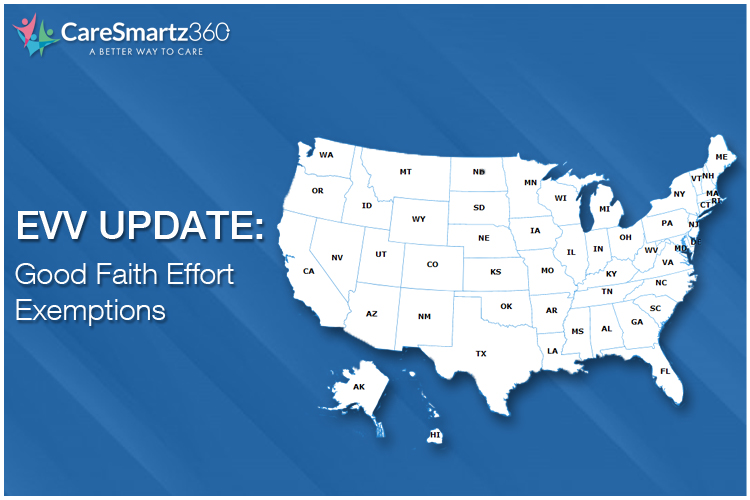How the EVV Good Faith Effort Exemption Impacts Home Care Agencies?

You may have heard of the term “Good Faith Effort Exemption.” If you are a home care agency owner and looking for detailed information on EVV (Electronic Visit Verification) deadline and implementation, then you have landed at the right spot.
For those who aren’t aware of “Good Faith Effort Exemption Request”- it is a request made by individual states of the United States to provide an exemption in implementing EVV before January 1st, 2020.
CMS (Centers for Medicare & Medicaid Services) has granted an exemption to many states who requested to extend the EVV implementation deadline. Since these states were trying hard to implement EVV before the 2020 deadline, CMS considered the unavoidable delays in implementation and granted exemption to the states.
Here’s everything home care agencies need to know about the new deadline for implementing EVV.
What do Home Care Agencies need to do?
Just like previously, home care agencies need to implement EVV per their respected state’s regulation. Agencies must check state compliance rules and their state’s exemption status regarding their Good Faith Effort Exemption so that they implement EVV as soon as possible to avoid FMAP reductions that start January 1st, 2021.
Since the new deadline for implementing EVV is January 1st, 2021, home care agencies must ensure that they implement EVV as soon as possible to comply with regulations.
Home care agencies, just like before, need to find third-party EVV vendors that can offer compliance to state and federal government regulations. Agencies should check whether their state has been offered an extension or not.
Some states didn’t ask for an extension and some states’ request for Good Faith Efforts is still pending. This doesn’t mean that home care agencies in those particular states should wait. They should implement EVV as soon as possible to avoid FMAO reductions (that would be applicable in both the cases) that started January 1st, 2020, in case their state doesn’t get the exemption.
Agencies can visit the Medicaid official website to check their state’s exemption status for more details. It is strongly recommended that agencies that haven’t yet implemented EVV consider becoming compliant through a trusted partner.
Related blog posts:
EVV Extension 2021 – What Home Care Agencies Need to KnowHow to Implement EVV in States with Exemption under Good Faith Efforts

